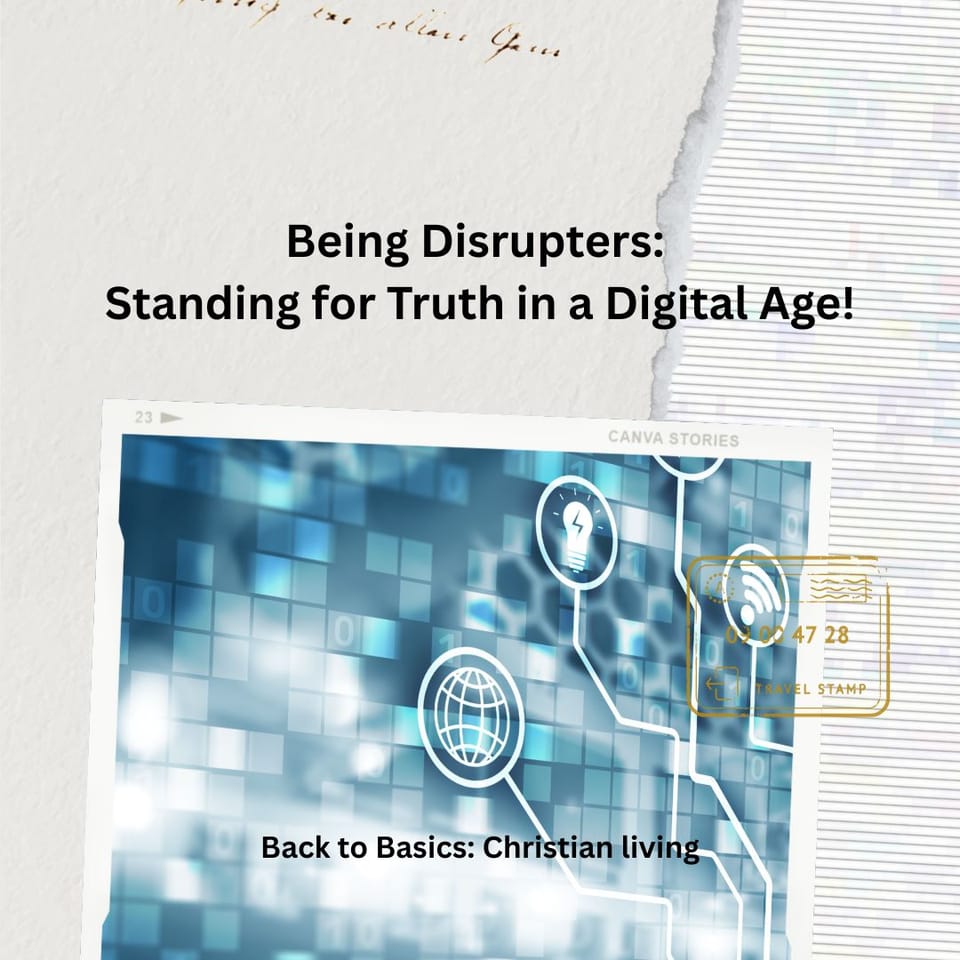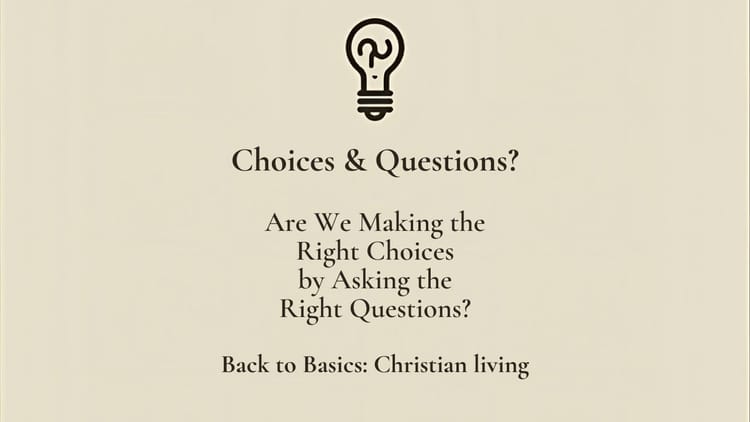Being Disrupters: Standing for Truth in a Digital Age!

Boldly Defending Biblical Truth in a World of Digital Deception!
In today's ever-evolving digital landscape, the role of the faithful believer has taken on new dimensions. We are called not merely to consume information passively but to be active disrupters of falsehood, particularly when it infiltrates the church. This disruption isn't about causing chaos; rather, it's about standing firmly for biblical truth in a world increasingly comfortable with compromise and distortion.
The Apostle Paul, writing to his young protégé Timothy, warned of this very situation: "For the time will come when they will not endure sound doctrine; but after their own lusts shall they heap to themselves teachers, having itching ears; And they shall turn away their ears from the truth, and shall be turned unto fables." (2 Timothy 4:3-4, KJV). This prophetic warning has never been more relevant than in our current digital age, where false teachings can spread globally with unprecedented speed.
The Call to Disrupt False Narratives
Throughout Scripture, we see godly men and women who stood against the prevailing false narratives of their day. Consider Elijah, who confronted the prophets of Baal on Mount Carmel, declaring boldly, "How long halt ye between two opinions? if the LORD be God, follow him: but if Baal, then follow him." (1 Kings 18:21, KJV). This ancient confrontation reminds us that truth has always required courageous defenders.
In our digital world, disrupting false narratives means engaging thoughtfully with content that claims to be biblical but deviates from sound doctrine. It means speaking up when popular teachers compromise on essential truths. The prophet Jeremiah lamented, "The prophets prophesy falsely, and the priests bear rule by their means; and my people love to have it so: and what will ye do in the end thereof?" (Jeremiah 5:31, KJV). Similarly, we must ask ourselves what the end result will be if we allow false teachings to go unchallenged in our digital spaces.
Recognising False Teachings in the Digital Age
How do we identify false teachings that require disruption? Scripture provides clear markers:
- Teachings that deny Christ: "Hereby know ye the Spirit of God: Every spirit that confesseth that Jesus Christ is come in the flesh is of God: And every spirit that confesseth not that Jesus Christ is come in the flesh is not of God." (1 John 4:2-3, KJV)
- Messages focused primarily on material prosperity: "For the love of money is the root of all evil: which while some coveted after, they have erred from the faith, and pierced themselves through with many sorrows." (1 Timothy 6:10, KJV)
- Doctrines that undermine the authority of Scripture: "All scripture is given by inspiration of God, and is profitable for doctrine, for reproof, for correction, for instruction in righteousness." (2 Timothy 3:16, KJV)
- Teachings that promote moral relativism: "Woe unto them that call evil good, and good evil; that put darkness for light, and light for darkness; that put bitter for sweet, and sweet for bitter!" (Isaiah 5:20, KJV)
- Messages that elevate human traditions above divine commandments: "But in vain they do worship me, teaching for doctrines the commandments of men." (Matthew 15:9, KJV)
Digital Disruption with Grace and Truth
As we stand against false narratives, we must remember that our approach matters as much as our message. The Apostle Peter instructs us to be "ready always to give an answer to every man that asketh you a reason of the hope that is in you with meekness and fear" (1 Peter 3:15, KJV). Our digital disruption must be characterised by both conviction and compassion.
Consider how Jesus confronted the religious leaders of His day. He spoke truth boldly, yet His ultimate purpose was redemptive. When He cleared the temple, declaring, "It is written, My house shall be called the house of prayer; but ye have made it a den of thieves" (Matthew 21:13, KJV), He was disrupting a false religious system to restore true worship.
Similarly, our digital disruption should aim not merely to tear down falsehood but to rebuild with truth. Paul reminds us that our speech should "be alway with grace, seasoned with salt, that ye may know how ye ought to answer every man" (Colossians 4:6, KJV).
Practical Ways to Be Digital Disrupters
- Ground yourself deeply in Scripture: "Study to shew thyself approved unto God, a workman that needeth not to be ashamed, rightly dividing the word of truth." (2 Timothy 2:15, KJV)
- Evaluate all teachings against biblical truth: "These were more noble than those in Thessalonica, in that they received the word with all readiness of mind, and searched the scriptures daily, whether those things were so." (Acts 17:11, KJV)
- Speak truth boldly but lovingly: "But speaking the truth in love, may grow up into him in all things, which is the head, even Christ." (Ephesians 4:15, KJV)
- Create content that clarifies biblical teaching: "So shall my word be that goeth forth out of my mouth: it shall not return unto me void, but it shall accomplish that which I please, and it shall prosper in the thing whereto I sent it." (Isaiah 55:11, KJV)
- Build communities centred on sound doctrine: "Not forsaking the assembling of ourselves together, as the manner of some is; but exhorting one another: and so much the more, as ye see the day approaching." (Hebrews 10:25, KJV)
The Cost of Being a Disrupter
Standing for truth in a digital age will not always be comfortable or popular. Jesus warned His followers, "If the world hate you, ye know that it hated me before it hated you." (John 15:18, KJV). Digital disruption may lead to unfollowing, criticism, or even more serious forms of persecution.
Yet the Scriptures consistently affirm that such costs are worth bearing. Jesus assured us, "Blessed are ye, when men shall revile you, and persecute you, and shall say all manner of evil against you falsely, for my sake. Rejoice, and be exceeding glad: for great is your reward in heaven." (Matthew 5:11-12, KJV)
Disruption for Restoration
Our calling as digital disrupters is ultimately about restoration, not mere opposition. We disrupt false narratives because we long to see the church return to the "faith which was once delivered unto the saints" (Jude 1:3, KJV). We stand against compromise because we believe in the transformative power of unadulterated biblical truth.
As we navigate the complex digital landscape of our day, may we be found faithful in this sacred calling. May we be like the men of Issachar, "which were men that had understanding of the times, to know what Israel ought to do" (1 Chronicles 12:32, KJV). And may our digital disruption lead many to discover the liberating truth that "ye shall know the truth, and the truth shall make you free" (John 8:32, KJV).
In a world of shifting opinions and trendy theologies, let us be anchored in the unchanging Word of God, disrupting with grace and rebuilding with truth, for the glory of Christ and the good of His church…
Key Takeaways:
- Truth requires defenders in every age: Like biblical figures such as Elijah and Jeremiah, Christians today must stand against false narratives.
- Digital platforms amplify both truth and falsehood: The unprecedented speed at which teachings spread online makes discernment more crucial than ever.
- Scripture provides clear markers of false teaching: These include denying Christ's nature, focusing primarily on prosperity, undermining biblical authority, promoting moral relativism, and elevating human traditions.
- Our approach matters as much as our message: Digital disruption should be characterised by both conviction and compassion, speaking truth in love.
- There is a cost to standing for truth: While defending truth may bring criticism or rejection, Scripture assures us that such costs are worth bearing.
- The ultimate goal is restoration: We disrupt false narratives not merely in opposition, but to restore the church to biblical foundations.





